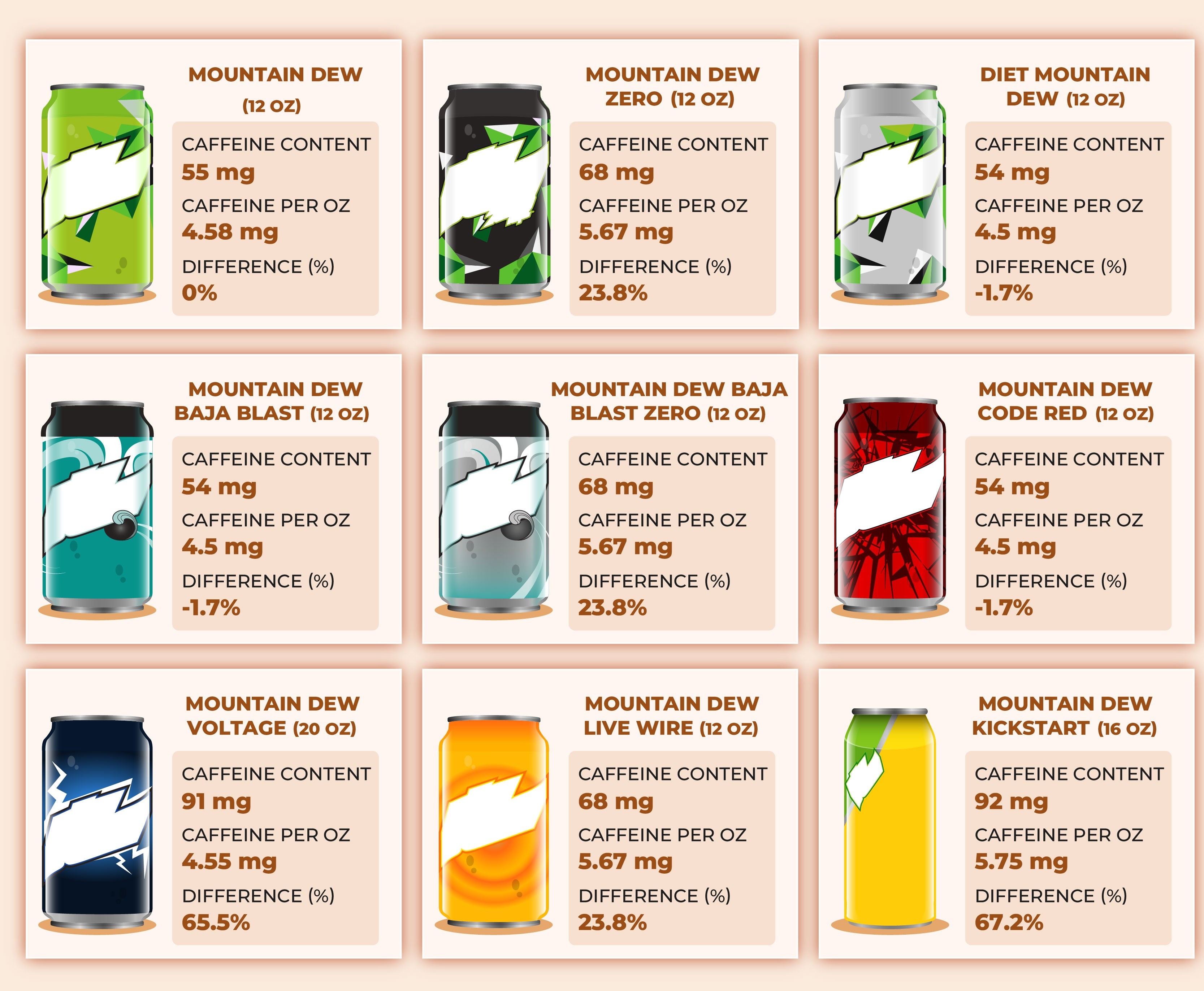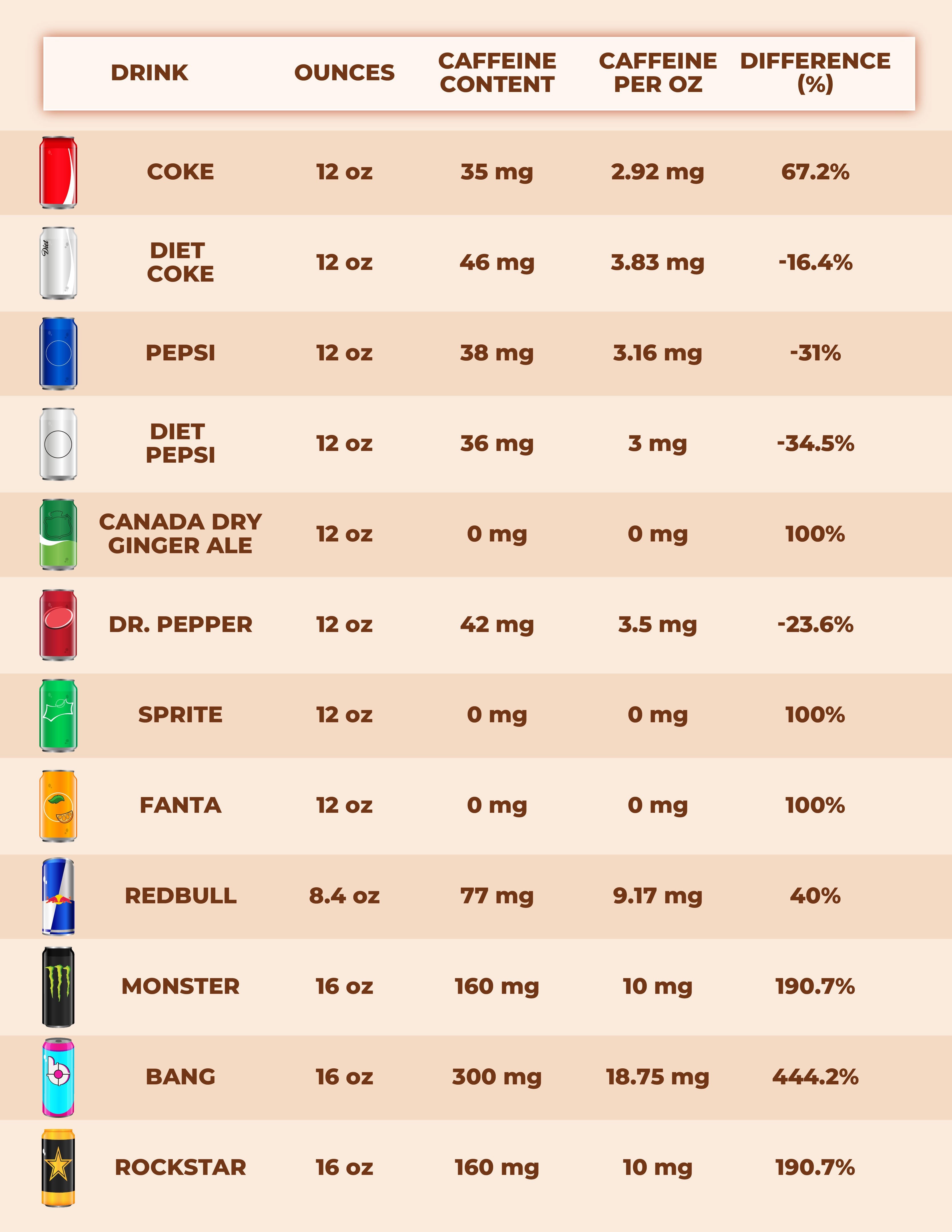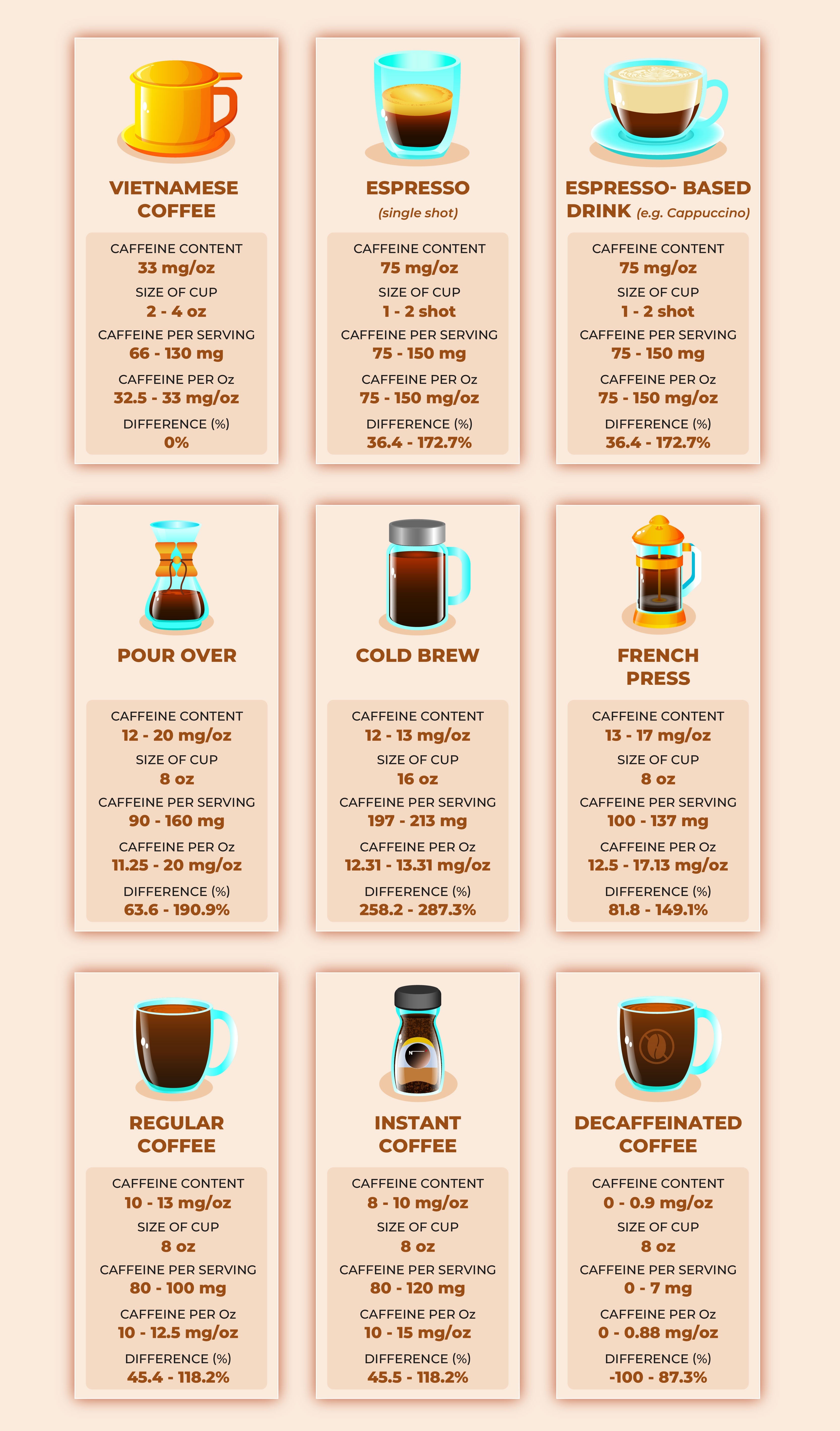Mountain Dew Caffeine Content: Unveiling the Facts with HOW.EDU.VN. Wondering about the caffeine levels in your favorite citrus soda? This article breaks down the caffeine content in various Mountain Dew flavors and compares it to other popular caffeinated beverages, offering expert insights and addressing potential health concerns. Discover the truth about Mountain Dew’s caffeine and make informed choices regarding your consumption of caffeinated soda and energy drinks.
1. Comparing Caffeine Levels in Mountain Dew Drinks
Mountain Dew is known for its distinct taste and notable caffeine content. While the exact amount varies depending on the specific type and serving size, understanding the range is crucial for managing your caffeine intake. Let’s break down the caffeine levels found in some of the most popular Mountain Dew varieties.
Different flavors and formulations of Mountain Dew contain varying amounts of caffeine. For example, a 12-ounce can of original Mountain Dew typically contains around 55 milligrams of caffeine. However, other varieties, such as Mountain Dew Energy or Mountain Dew Kickstart, can have significantly higher caffeine levels.
Here’s a detailed breakdown of caffeine content in popular Mountain Dew drinks:
| Mountain Dew Variant | Caffeine Content (per 12 oz) | Notes |
|---|---|---|
| Original Mountain Dew | 55 mg | Standard caffeine level. |
| Diet Mountain Dew | 55 mg | Same caffeine level as the original. |
| Mountain Dew Code Red | 55 mg | Similar caffeine content. |
| Mountain Dew Voltage | 69 mg | Higher caffeine level compared to the original. |
| Mountain Dew White Out | 68 mg | Slightly higher than the original. |
| Mountain Dew Kickstart | 68-92 mg | Varies by flavor; often marketed as an energy drink alternative. |
| Mountain Dew Game Fuel | 90 mg | Marketed towards gamers, with a focus on enhanced energy and focus. |
| Mountain Dew Energy | 180 mg | A higher caffeine offering intended to compete with energy drinks. |
| Mountain Dew Zero Sugar | 55 mg | Matches original Mountain Dew caffeine levels, but with zero sugar. |
| Caffeine-Free Diet Mt Dew | 0 mg | No caffeine, for those seeking to avoid stimulants. |



This table offers a quick reference for those looking to monitor their caffeine consumption when choosing a Mountain Dew product. Understanding the caffeine levels in different varieties can help you make informed decisions based on your personal preferences and tolerance.
2. How Mountain Dew Compares to Other Caffeinated Beverages
To fully appreciate the caffeine content in Mountain Dew, it’s essential to compare it with other beverages you might consume regularly. This comparison provides a better perspective on whether Mountain Dew is a high, moderate, or low source of caffeine relative to alternatives like coffee, tea, and other sodas.
Mountain Dew’s caffeine content typically falls within the moderate range when compared to other popular drinks. While it contains more caffeine than some sodas, it generally has less than coffee and many energy drinks. This makes it a middle-ground choice for those seeking a caffeine boost without the intensity of stronger beverages.
2.1 Mountain Dew vs. Other Sodas and Energy Drinks
When stacked against other sodas and energy drinks, Mountain Dew holds a unique position. Most regular sodas contain significantly less caffeine, while many energy drinks boast much higher amounts. Here’s a detailed comparison:
| Beverage | Caffeine Content (per 12 oz) |
|---|---|
| Coca-Cola | 34 mg |
| Pepsi | 38 mg |
| Dr. Pepper | 41 mg |
| Mountain Dew | 55 mg |
| Red Bull | 111 mg |
| Monster Energy | 120 mg |
| Starbucks Doubleshot | 135 mg |
From the table, it’s evident that Mountain Dew has a higher caffeine content than traditional sodas like Coca-Cola and Pepsi, but less than popular energy drinks like Red Bull and Monster. This makes it a moderate choice for those seeking a caffeine lift.
2.2 Mountain Dew vs. Coffee
Coffee is often the go-to beverage for those needing a significant energy boost. Comparing it to Mountain Dew reveals some interesting differences. The caffeine content in coffee can vary widely depending on the type of bean, brewing method, and serving size.
Generally, coffee contains more caffeine than Mountain Dew. An average 8-ounce cup of coffee has about 80-100 mg of caffeine, while a 12-ounce can of Mountain Dew has 55 mg. Therefore, if you’re looking for a stronger caffeine kick, coffee might be the better choice.
Here’s a quick comparison:
| Beverage | Caffeine Content | Serving Size |
|---|---|---|
| Mountain Dew | 55 mg | 12 oz |
| Brewed Coffee | 80-100 mg | 8 oz |
| Espresso | 63 mg | 1 oz |
| Instant Coffee | 30-90 mg | 8 oz |
| Cold Brew Coffee | 100-200 mg (or more) | 8 oz |
The type of coffee preparation greatly influences its caffeine content. Espresso, despite its small serving size, is highly concentrated, while cold brew typically steeps for an extended period, resulting in a higher caffeine concentration. If you prefer a milder caffeine effect, Mountain Dew could be a suitable alternative to coffee.
3. Potential Risks and Side Effects of Caffeine
While caffeine is widely consumed and generally considered safe in moderate amounts, excessive intake can lead to various adverse effects. It’s crucial to understand these potential risks to make informed decisions about your caffeine consumption.
Consuming too much caffeine can result in side effects such as insomnia, anxiety, increased heart rate, and digestive issues. The severity of these effects varies from person to person, depending on factors like age, weight, and individual sensitivity to caffeine.
According to experts, most healthy adults can safely consume up to 400 milligrams of caffeine daily. This is equivalent to about seven 12-ounce cans of Mountain Dew. However, it is essential to recognize individual differences in caffeine tolerance. Some individuals may experience negative symptoms even at lower doses, while others may tolerate higher amounts without significant issues.
3.1 Common Side Effects of Excessive Caffeine
Exceeding the recommended daily caffeine intake can trigger a range of unpleasant symptoms. Being aware of these can help you monitor your consumption and prevent overstimulation.
Some of the most common side effects include:
- Insomnia: Caffeine can interfere with your sleep patterns, making it difficult to fall asleep or stay asleep.
- Anxiety: High doses of caffeine can exacerbate anxiety symptoms, leading to restlessness and nervousness.
- Increased Heart Rate: Caffeine can stimulate the cardiovascular system, causing a temporary increase in heart rate and blood pressure.
- Upset Stomach: Caffeine can increase stomach acid production, leading to heartburn, acid reflux, and other digestive issues.
- Headache: While caffeine can sometimes relieve headaches, excessive intake can paradoxically cause them.
- Chest Pain: In some individuals, high caffeine doses can trigger chest pain or discomfort.
- Heart Palpitations: These are feelings of a rapid, fluttering, or pounding heart, which can be alarming.
These side effects are generally temporary and subside as the caffeine is metabolized. However, consistent overconsumption can lead to more serious health issues.
3.2 Extreme Cases and Medical Attention
In rare cases, excessive caffeine intake can lead to severe medical complications that require immediate attention. It’s crucial to be aware of these possibilities, although they are uncommon.
Severe symptoms can include:
- Confusion: Feeling disoriented or having difficulty thinking clearly.
- Hallucinations: Experiencing sensory perceptions that are not real.
- Difficulty Breathing: Shortness of breath or labored breathing.
- Uncontrollable Movements: Muscle twitching, tremors, or seizures.
These symptoms can be life-threatening and necessitate prompt medical intervention. If you or someone you know experiences these issues after consuming caffeine, seek emergency medical care immediately.
4. Addressing Common Questions about Caffeine in Mountain Dew
To help you better understand the role of caffeine in Mountain Dew, here are answers to some frequently asked questions. These insights can guide you in making informed choices about your consumption habits.
4.1 Are There Caffeine-Free Mountain Dew Options?
For individuals seeking to reduce or eliminate caffeine from their diet, caffeine-free alternatives are available. These options allow you to enjoy the taste of Mountain Dew without the stimulant effects.
Yes, Caffeine-Free Diet Mountain Dew is available in select regions. This variety offers the same flavor profile as regular Diet Mountain Dew without any caffeine content. However, it is not as widely distributed as the caffeinated versions, so availability may vary.
4.2 How Much Mountain Dew is Too Much?
Determining a safe consumption level depends on several factors, including your individual tolerance, overall health, and other caffeine sources in your diet. Moderation is key to avoiding potential negative effects.
Due to its high sugar content, excessive consumption of Mountain Dew can lead to several health issues, including:
- Diabetes: High sugar intake can increase the risk of developing type 2 diabetes.
- Obesity: The high calorie and sugar content can contribute to weight gain and obesity.
- Dental Problems: Sugar promotes tooth decay and cavities.
- Heart Disease: Excessive sugar intake can increase the risk of cardiovascular issues.
- Fatty Liver Disease: High sugar consumption can lead to the accumulation of fat in the liver.
The American Heart Association recommends that women consume no more than 25 grams of added sugar daily, while men should aim for under 36 grams. A 12-ounce can of Mountain Dew contains approximately 46 grams of sugar, exceeding these recommendations. Therefore, limiting Mountain Dew consumption is advisable.
4.3 Is Mountain Dew Safe During Pregnancy?
Pregnant women need to be especially cautious about their caffeine intake. High caffeine consumption during pregnancy has been linked to several potential risks.
Experts recommend that pregnant women limit their daily caffeine intake to under 200 mg. Higher amounts can increase the risk of:
- Miscarriage
- Birth Defects
- Premature Labor
- Reduced Fertility
Additionally, Mountain Dew contains high levels of sugar and artificial additives, which can also pose risks during pregnancy. While an occasional Mountain Dew may be acceptable, it should not become a regular part of a pregnant woman’s diet. Consulting with a healthcare provider for personalized advice is always recommended.
4.4 Risks of Mixing Mountain Dew with Alcohol
Combining Mountain Dew with alcohol can lead to several adverse effects. Both sugar and caffeine can mask the intoxicating effects of alcohol, leading to overconsumption and potential alcohol poisoning.
Mixing alcohol and Mountain Dew can also contribute to dehydration and exacerbate hangover symptoms. Additionally, the stimulant effects of caffeine can counteract the depressant effects of alcohol, potentially leading to risky behaviors and impaired judgment.
4.5 Can Mountain Dew Lead to Caffeine Addiction?
Regular consumption of caffeinated beverages like Mountain Dew can lead to physical dependence and addiction. Caffeine is a stimulant that activates the reward centers in the brain, making it habit-forming.
Symptoms of caffeine addiction include:
- Inability to Reduce Consumption: Difficulty cutting back or controlling caffeine intake.
- Withdrawal Symptoms: Experiencing headaches, fatigue, depression, and anxiety when caffeine is reduced or eliminated.
- Severe Cravings: Intense urges to consume caffeine.
If you experience these symptoms, it may be a sign of caffeine dependence. Gradually reducing your caffeine intake and seeking support from healthcare professionals can help manage addiction and withdrawal symptoms.
5. Need Expert Advice on Managing Your Caffeine Intake?
Navigating the complexities of caffeine consumption can be challenging, especially given the variety of caffeinated beverages available and individual differences in tolerance. Do you find yourself struggling to balance your love for caffeinated drinks with concerns about their potential health effects? Are you unsure how to safely manage your caffeine intake, especially if you have underlying health conditions or specific concerns like pregnancy?
At HOW.EDU.VN, we connect you with leading PhDs and experts who can provide personalized guidance tailored to your unique needs. Our experts understand the nuances of caffeine metabolism, potential interactions with medications, and the importance of sustainable, balanced lifestyle choices. They can help you:
- Assess Your Current Caffeine Intake: Analyze your current consumption habits and identify potential areas for improvement.
- Develop a Personalized Caffeine Management Plan: Create a tailored plan that aligns with your health goals, preferences, and individual tolerance.
- Address Specific Health Concerns: Provide guidance on managing caffeine intake in the context of pregnancy, heart conditions, anxiety, and other health issues.
- Offer Strategies for Reducing Caffeine Dependence: Develop strategies to gradually reduce caffeine intake and minimize withdrawal symptoms.
- Educate You on the Latest Research: Stay informed about the latest scientific findings related to caffeine and its effects on the body.
6. Connect with Our Experts Today
Don’t navigate the complexities of caffeine alone. Contact HOW.EDU.VN today and let our team of experienced PhDs provide the expert guidance you need to make informed choices and optimize your health. Our experts are ready to answer your questions, address your concerns, and help you develop a sustainable, balanced approach to caffeine consumption.
Contact us at:
- Address: 456 Expertise Plaza, Consult City, CA 90210, United States
- WhatsApp: +1 (310) 555-1212
- Website: HOW.EDU.VN
Take control of your health and well-being with HOW.EDU.VN. Our dedicated team is committed to providing you with the highest quality advice and support, ensuring you can enjoy your favorite beverages responsibly and with confidence.
7. Transform Your Health with Expert Guidance
At HOW.EDU.VN, we believe that informed choices are the foundation of a healthy lifestyle. Our commitment to providing expert, personalized advice sets us apart as a trusted resource for individuals seeking to optimize their well-being.
Here’s why you should choose HOW.EDU.VN for your health and wellness needs:
- Access to Top-Tier Experts: Connect with PhDs and specialists who are leaders in their respective fields.
- Personalized Guidance: Receive advice tailored to your unique health profile, preferences, and goals.
- Comprehensive Support: Benefit from holistic strategies that address all aspects of your well-being.
- Convenient and Accessible Services: Get the support you need, when and where you need it, through our user-friendly platform.
- Trusted and Reliable Information: Rely on evidence-based insights and the latest research to make informed decisions.
Don’t wait any longer to prioritize your health. Contact how.edu.vn today and experience the transformative power of expert guidance.
8. Additional Resources and Support
For more information about caffeine and its effects, consider exploring these resources:
- The Mayo Clinic: Provides comprehensive information on caffeine, including its benefits, risks, and recommended intake levels.
- The American Heart Association: Offers guidance on healthy eating habits, including limiting added sugar and caffeine intake.
- The National Institutes of Health (NIH): Features research articles and scientific findings related to caffeine and its impact on various health conditions.
By staying informed and seeking expert advice, you can make empowered choices that support your long-term health and vitality.
